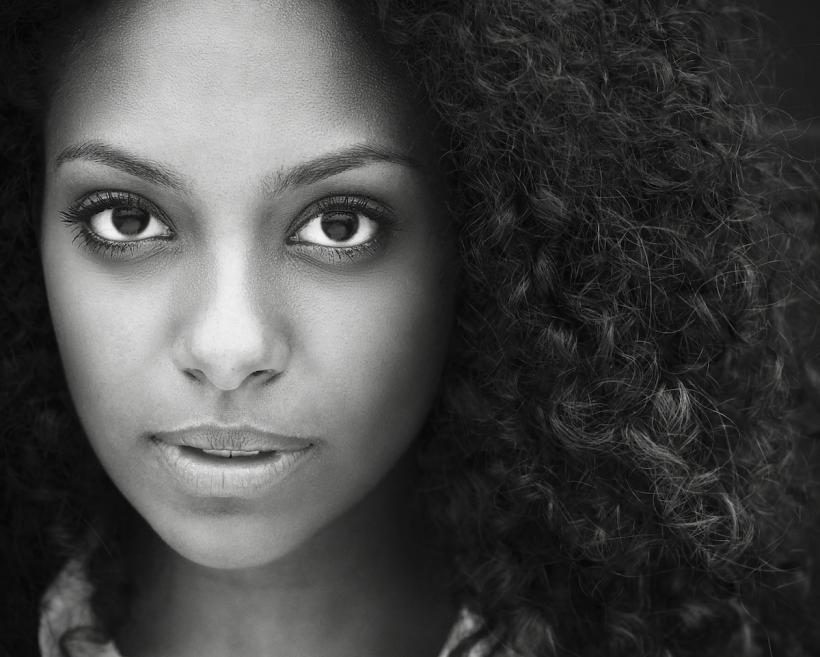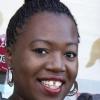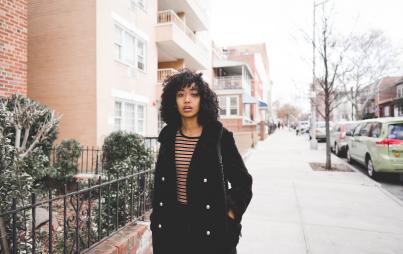
Stand with us. Period.
The attack on Black women is coming fast and hard from every angle. If we say, “It’s not for you," it’s not an affront to you or your non-Blackness. We still want to be friends. We still consider you sisters, but you need to consider us sisters too.
Trust and believe Ravishers, it is no coincidence that as I sat down to write this article, Auntie Bey’s “Formation” came on, followed by Janelle Monae’s “Q.U.E.E.N.”
This article has been willed by sweet, 6-pound baby Jesus himself. The universe is spinning so perfectly on its axis that not even the haters can get me on this one. It’s level. It’s on point. It is exactly how and where it needs to be.
That being said, do you remember the other day when I hipped you to the revelation that we (Black women) have lips?
And remember how I told you about the nasty little trolligans (trolls + hooligans = trolligans) that felt the need to show their racist behinds in response to a picture of Aamito Stacie Lagum, a Black model, modeling MAC’s new lipstick? And I slightly hinted at the Instagram clapback (response) on the MAC photo feed.
Well, what I didn’t tell you is that there’s an Instagram clapback, and then there’s a BLACK Instagram clapback. The two are worlds apart, and baby I promise you, you have seen nothing until you’ve seen a Black Insta-clapback.
It is the most delicious, beautiful, pride-filled, make-your-heart-burst-and-your-eyes-leak thing on the internet. And it was spearheaded by not one, but two Black women who are hell-bent on making sure that sistas know they are beautiful and worthy. They are also determined to let the world know that if you come for us, we will create a wall so damn impenetrable that a chastity belt will look like some damn Silly Putty.
Ravishers, meet Thembisa Mshaka and Dr. Yaba Blay. Collectively, they are the creative geniuses behind the Instagram handles @officiallipgame and @prettyperiod365. They (not MAC, as some wrongly believe) are the fierce, fly-as-hell ladies that ushered in the Insta-clapback for the ages, #prettylipsperiod (created by and for black women, much like “Formation." Huh. How ’bout that?).
Thembisa Mshaka is a multi-award winning filmmaker and creative producer. She has worked with everyone from Beyoncé (as the marketing campaign writer for “The Writing's On The Wall,” “Survivor,” the Charlie's Angels soundtrack, and “Dangerously In Love”) to George Michael (“The Very Best of George Michael”) during her tenure as Senior Advertising Copywriter for Sony Music (where her career campaign sales exceed 170 million units — WOAH!).
And as if that weren’t enough, she is also the author of the critically acclaimed Handle Your [entertainment] Business. Chuck D of Public Enemy (yes, the Chuck D) hails her book as “the definitive entertainment industry bible.”
Dr. Yaba Blay is the Dan Blue Endowed Chair in Political Science at North Carolina Central University and is the best-selling author of (1)ne Drop: Shifting the Lens on Race. Her commentary has been featured on CNN, MSNBC, NPR, Ebony Magazine, The Root, Huffington Post, and Al Jazeera America. She was named The Root’s Top Black Influencer in 2014, and is also the publisher and editor-in-chief of BLACKprint Press.
Damn! Has your head exploded yet? Yes, y’all, these ladies are the business.
Now, because I am a Black woman who felt some sorta way about the trolligans tearing down model Aamito Stacie Lagum for having God-given, bee-stung, juicy goodness lips, I jumped at the chance to support when I saw the call for sistas to unite.
The call was simple, and it was a call to the sistas: Take a picture of your lips, tag @officiallipgame and @prettyperiod365, and use the hashtag #prettylipsperiod. Done.
Y’all know it is nothing for me to slide on some lipstick and snap a pic.
However, I got more than I expected. From speaking with Mshaka and Blay, I think it’s safe to say they did too.
In the last three days, over 2,500 photos have been posted to the #prettylipsperiod campaign. 2,500.
So, to break it down for you, the trolligans were Miley Cyrus, and Black Instagram was Nicki Minaj. And then this happened:
With one simple hashtag, Mshaka and Blay let the trolligans (and Instagram as a whole) know that you absolutely cannot come for a Black woman without an entire damn army of her sisters surrounding her like a swarm of bees. You want to know what it’s like to be part of Auntie Bey’s Beyhive? Well, that’s about as close as it gets.
Within hours of the call to action, hundreds upon hundreds of Instagram pictures were flooding their feeds. According to Mshaka, some ladies even went out and bought new lipstick for their photos, because when we show up, we show out.
But it wasn’t just about showing the haters that you can’t come for us without some serious clapback. It was also about letting other Black women know the inherent beauty they possess. I asked Mshaka to explain the campaign’s end goal. She answered, “I wanted women to celebrate themselves as they were celebrating the model in the photo. In this case, the best way to combat hatred is through appreciation, so we started this campaign and in no time we had this wave, love fest, cavalcade of gorgeousness. It was incredibly affirming. That’s how we win. We usher in a tidal wave of positivity.”
And that’s exactly what they did. Everywhere I looked there were pictures of beautiful Black women showcasing their pretty pouts. Twitter had it. Facebook had it. I bet if I were on Snapchat, I’d have seen 8,000 10-second clips of Black women affirming their individual beauty.
Tidal wave, typhoon, tsunami, whatever you want to call it: Black Instagram came through (showed up).
When I asked Mshaka about her feelings regarding MAC’s response, our feelings were mutual. “MAC’s response,” she told me, “was very broad based, whereas ours was very pointed and specific. We know what we need.”
This is something Dr. Blay agrees with 100 percent: “MAC made no mention of the human being that was attacked in their response. The response needed to be about addressing the humanity of the person being attacked.”
While I feel that MAC handled it in a way that corporations find acceptable, I also agree with Blay and Mshaka. I didn’t realize how “blanket” the MAC statement was until it was pointed out to me.
“These trolls and their comments, this is just the new language of new racism. That’s all it is, and we have to see it for what it is and respond appropriately.”
A bit embarrassed by my miss, I asked Dr. Blay more about her reason for initiating this epic clapback. To my surprise, this was not her first rodeo.
Three years ago, 7-year-old Tiana Parker was suspended from school for having dreadlocks. Dreadlocks.
Now, her dad was a barber, so you know Tiana’s hair was on point — but the school said that the hairstyle was “unacceptable and inappropriate.” The result: Tiana moved schools.
Dr. Blay heard about this and was outraged, but what spurred her to action was seeing a video of this little girl crying about the situation. She loved her hair, and the ignorance of a few made her question who and what she was — BEAUTY. Blay says she is often “pushed to move when she sees a sister pushed in a direction that would make her question her beauty and worth.” She moved in a major way.
She started a social media campaign around women with dreadlocks, and in true hive fashion, women sent in thousands of pictures of themselves displaying their beautiful hair. Women of every shade of brown, of every profession, of every everything — and this child saw her beauty reflected a thousand times over.
Mission accomplished.
Dr. Blay reaffirmed this child’s sense of self-worth, sense of beauty, and sense of self in a world that is hell-bent on telling Black girls they ain’t shit but a baby mama. She said, “Black people have long been anxious about how we are viewed in White society, and many of us hold on to these old school ideas about how we should wear our hair in order to be respected and be seen as respectable. And that's simply not true. Ava Duvernay has dreadlocks. Tell me she’s not respected.”
Also, in case you thought to yourself, “Oh, Adiba — she directed Selma. Of course she’s respected!” Here are some pictures of a doctor, a lawyer, Dr. Yaba Blay, Thembisa Mshaka, and a college student, all with dreadlocks. So there’s that.
Dr. Blay definitely has a point, and whether you want to admit it or not, you know she’s right. Simply on the basis that you might call yourself a feminist, you know, I know — hell, we all know she’s right.
As I nodded my affirmations, I needed to know more about this Insta-clapback. What were her thoughts about the underlying issues of the trolligans and their vitriol? What was at the core of what she wanted Black women to know with this clapback? Did she see a direct link between this, the Black Lives Matter movement, and the Body Love movement? Because I did.
Folks, she gave me chills: “These trolls and their comments — this is just the new language of new racism. That’s all it is, and we have to see it for what it is and respond appropriately. There’s a way to clap back, and my way is to spread a wall of love around us. All of this work is about checking us. We don’t have to wait for them to love us for us to love us.”
That is so deep and sat so heavy on my heart. As soon as she spoke the words, I was transported to memories of the countless hours I spent as a child wishing I had lighter skin, straighter hair, blue eyes, thinner lips — just so the boys would like me. I wanted them to love me, but I didn’t even know how to love myself. I didn’t even know it was acceptable to love myself.
Can you believe that? I just didn’t know.
We continued our conversation, and in pure Dr. Blay fashion, she continued to drop bombs, saying, “Characteristics are seen as ‘human,’ so if society, and media, and trolls are constantly saying that the characteristics of the Black body are not acceptable, not appropriate, not ‘normal,’ then this breakdown makes us subhuman, and, therefore, easier to kill. It begs the question, ‘What does it mean to be in a body that is constantly devalued’? This absolutely ties into the Black Lives Matter and Body Love movements.”
Her next statement stopped me dead in my tracks. I asked her what her thoughts were about the people who say that the creation of these hashtags and the social media campaigns are divisive, perpetuating racism and race wars.
She replied, “If this is considered divisive, then it is not my job to not be divisive. If the world is tearing me down, how dare you ask me not to pick myself back up!”
I need to pause here.
I have never heard the very beat of my heart spoken from someone else's mouth. I couldn’t have strung more perfect words together myself. She captured everything I think about when I think about raising my daughter in a world that will look at her as less than because of her disability. She captured everything I pray I can pass down to my daughter while raising her in a world that will tear her down limb by limb, kinky strand of hair by kinky strand of hair, because of the melanin in her skin.
She breathed life to the daydreams I have of raising a Warrior Queen in a world that has devalued her existence from the moment they pulled her from my open belly — because she was born with a vagina and not a penis.
Typing these words leave me breathless, gut-wrenched, teary-eyed.
I need you to think about this, folks. Stop and think about it. The attack on Black women is coming fast and hard from every angle. If we say, “It’s not for you," it’s not an affront to you or your non-Blackness. We still want to be friends. We still consider you sisters — but you need to consider us sisters too.
Don’t stand in front of me while I push my daughter’s wheelchair up the fucking hill. Stand next to me and help me push. Stand behind me and push me when I’m tired and not sure I can push any further.
Stand with us. Period.
Because we are here. Dreadlocked hair and big, soup-coolin’ lips. We are here, and we are going nowhere.
And if the world won’t love us, we’ll love ourselves. All day, every day.
Period.








